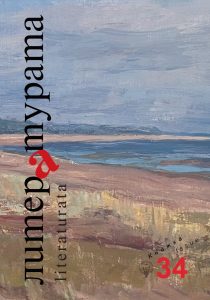https://doi.org/10.60056/Lit.2024.33.349-375
https://www.ceeol.com/search/article-detail?id=1306326
The Modern Literary Witch: Observations on Medial, Pop-Cultural, and Literary Reincarnations of the Witch Image in the 21st Century
Preslava Peneva
Sofia University “St. Kliment Ohridski”, Bulgaria
preslava_p10@abv.bg
The study aims to trace the development and transformation of the image of the witch in 21st-century Bulgarian literature. By analyzing contemporary representations of the “witch” archetype, the research draws comparisons between modern interpretations of witch-like women in Bulgarian literature and their counterparts from the classical literary canon. The study highlights key similarities and differences, focusing on characters from Yordan Yovkov’s “The Reaper” (1920), Dimitar Talev’s “The Bells of Prespa” (1954), and Vasil Popov’s “The Roots” (1967). To achieve this, the research examines female characters from contemporary popular works that fit into the witch paradigm, such as baba Zhiva from Ivynela Samuilova’s “Baba, Tell Me a Memory” (2016) and “Thus Spoke Baba Ega” (2019); baba Stoyka from Ina Yasipova’s “Alive” (2022) and “Dedicated” (2023); Velika Nyamata from Galina Taneva’s “The Silent Spoke” series (2022, 2023); Zevna and Zhara from Viktoriya Beshli- jska’s “Clay” (2020); and Ermena from Kiril Kambarev’s historical trilogy “The Boyar from Pannonia” (2013, 2017, 2020). The study will explore how these characters are classified as “witches” and how the traditional image of the witch influences their portrayal. Furthermore, it will analyze how central characteristics of the literary witch, such as her connection to folklore, her isolation from society, and her anti-female essence, manifest in these contemporary fig- ures. By comparing the classical and modern literary witches, this study sheds light on the evolving role of the witch in Bulgarian literature, revealing shifts in cultural perceptions of femininity, power, and otherness.
Keywords: witch, Bulgarian literature, popular literature, esotericism in literature, paganism in literature
For citation: Peneva, P. The Modern Literary Witch: Observations on Medial, Pop-Cultural, and Literary Reincarnations of the Witch Image in the 21st Cen- tury. // The Literature, Year XVIII, 2024, Issue 33. Sofia: Univerisity Press “St. Kliment Ohridski”. (In Bulgarian)
About the author: Preslava Peneva is a philologist by education – in 2023 she graduated in Bulgarian philology at the Sofia University “St. Kliment Ohridski”, and in 2024 she obtained a master’s degree in literary studies. She is the author of several publications in various scientific issues, dedicated to various fields – literary studies, linguistics, anthropology. She participates in the scientific project SUMMIT “Literary history in the 21st century: global models and Bulgarian practices” at Sofia University. Her interests are in the field of Bulgarian literature, comparative literary studies and the relations between literature, history and ideologies.

